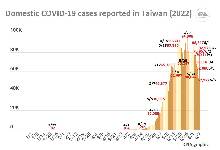
Taiwan COVID-19 News Briefs: June 7
ROC Central News Agency
06/07/2022 10:20 PM
Taipei, June 7 (CNA) Taiwan reported 83,027 new COVID-19 cases -- 82,973 domestically transmitted and 54 imported infections -- and 124 deaths from the disease on Tuesday, according to the Central Epidemic Command Center (CECC).
Here are some of the new developments regarding the COVID-19 situation around Taiwan on Tuesday:
Taiwan daily COVID cases could fall below 10,000 by late June
The number of new COVID-19 cases in Taiwan climbed back above 80,000 Tuesday after remaining below 80,000 for the past five days.
Commenting on the trend at a daily CECC briefing, Health Minister Chen Shih-chung (陳時中) said that the local epidemic is still at its peak but daily case numbers are likely to fall below 10,000 by the end of June.
Taiwan reported 82,973 new domestic COVID-19 cases on Tuesday, up from 52,992 on Monday, the lowest since May 10, according to the CECC.
Monday's case count may have been the result of fewer tests conducted over the Dragon Boat Festival holiday this past weekend, according to the CECC.

The figures do not include imported cases reclassified as domestic ones, nor retroactively removed cases. As of June 5, Taiwan recorded 2,512,968 domestic cases in 2022, while the total number of imported cases rose to 13,246 from 2,396 on Jan. 1.
Taiwan to maintain mask mandate through July
Taiwan will not lift its existing mask mandate in July but is considering adjusting COVID-19 border controls on a rolling basis, Chen said.
The CECC will maintain its mask mandate through July because wearing masks is effective at preventing the spread of respiratory viruses, Chen added.
The current mask mandate requires people to wear a mask at all times when they are outside of their homes, with some exceptions, such as when exercising outdoors, eating or participating in water-related activities.
On the issue of easing border controls, Chen said the CECC is planning to shorten the mandatory seven day quarantine period for business arrivals.
Currently, arrivals to Taiwan are required to quarantine for seven days, followed by another seven days of self-health management.
The CECC will make the plan public once it is finalized, he added.
Controversy continues over handling of deceased COVID patient remains
The controversy over whether there is a regulation stipulating the remains of confirmed COVID-19 patients must be cremated within 24 hours of death continues to attract public attention.
The controversy started after the CECC recently said there is no such regulation.
However, Chen said Tuesday that local governments are in practice having the remains of deceased people confirmed as infected with COVID-19 cremated within 24 hours of death.
Although the CECC has not given clear deadlines on cremation, this practice is right because it helps to reduce the risk of infection, Chen said.
The practice has invited criticism because it denies family members of deceased COVID-19 patients a final chance to say farewell to their loved ones.
In response to the criticism, Chen said family members cannot pay their respects to deceased loved ones because CECC rules stipulate that once sealed, body bags containing the remains of deceased COVID-19 patients cannot be reopened.
CECC adjusts criteria for COVID testing exemption
The CECC announced Tuesday it has relaxed the criteria for exemption from COVID-19 testing, allowing confirmed cases released from isolation to be exempted from testing when entering a hospital setting if they meet the new criteria.
Under the amended rules, hospitals can allow seven types of individuals to be exempted from testing requirements upon entry and regular testing if they have been diagnosed with COVID-19, released from isolation, and there are between 15 days and three months since the onset of symptoms or the first positive COVID-19 test, according to the CECC.
The categories of individuals include inpatients, individuals accompanying patients, visitors, patients kept in the emergency department for observation for at least 24 hours and persons accompanying them, healthcare workers and testing personnel, according to the CECC.
When the amended criteria come into effect will be announced by individual hospitals, the CECC added.
(By Evelyn Kao)
Enditem/AW
|
NEWSLETTER
|
| Join the GlobalSecurity.org mailing list |
|
|
|

